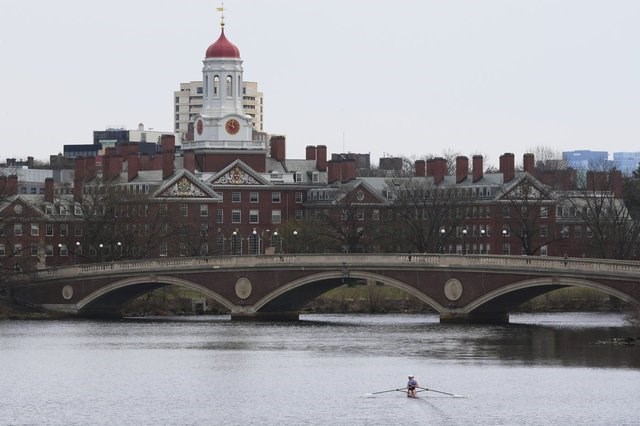
A sculler rows down the Charles River near Harvard University, at rear, Tuesday, April 15, 2025, in Cambridge, Mass. (AP Photo/Charles Krupa)
Republished April 15, 2025 - 6:05 PM
Original Publication Date April 15, 2025 - 12:41 PM
CAMBRIDGE, Mass. (AP) — In a high-stakes standoff, President Donald Trump's administration says it will freeze $2.2 billion in federal research grants for Harvard University, which is pushing back on demands for changes to campus policy.
The feud between the Republican administration and the nation's wealthiest college will be closely watched across higher education as the White House uses federal funding as leverage to pursue compliance with its political agenda.
But the impact will be felt most immediately by researchers at the Ivy League school and its partner institutions. While some have cheered Harvard's stand against demands to crack down on protesters and pursue more viewpoint diversity among faculty, others worry life-saving scientific research will be endangered.
Across the university in Cambridge, Massachusetts, federal money accounted for 10.5% of revenue in 2023, not counting financial aid such as grants and student loans.
What research will be affected?
Harvard has not released a list of affected grants, and it’s possible the university doesn’t yet have a clear idea of what might be frozen.
At other campuses hit with funding freezes, the details of the cuts only became clear over time as work orders were halted. At Brown University, a White House official said it was planning to freeze half a billion dollars in federal money on April 3, but university officials said Tuesday they still did not know which programs might be targeted.
At Harvard, an Education Department official said hospitals affiliated with the university will not be affected.
Five Boston-area teaching hospitals affiliated with Harvard Medical School, considered among the world’s top medical institutions, operate as financially independent non-profits. Their staff often have teaching appointments at Harvard Medical School and their research is funded largely by federal grants.
But the work that could be vulnerable to cuts includes research at Harvard's T.H. Chan School of Public Health, which says 46% of its budget last year was funded through federal grants. Among other things, this paid for research on cancer, Alzheimer's, stroke and HIV.
Why doesn’t Harvard use its sizable endowment to pay for research?
Harvard has a $53 billion endowment, the largest in the country. But Harvard leaders say the endowment is not an all-purpose account that can be used for anything the university pleases.
Many donors earmarked their contributions for a specific goal or project. And Harvard has said it relies on some of the endowment to help subsidize tuition costs for middle class and low-income students.
Last week, Harvard started working to borrow $750 million from Wall Street to help cover general expenses. The university has described the effort as part of contingency planning for a range of possible scenarios
What will this mean for undergraduate students?
Losing federal research grants could mean fewer research opportunities for Harvard undergraduate students. If the funding cuts drive away faculty, it could also mean less exposure to top-tier researchers.
Just last month Harvard had expanded financial aid so middle class families wouldn’t have to pay as much for tuition, room and board. It’s not clear whether losing federal grants might affect those plans.
Outsiders have suggested Harvard and other universities should cut back on top-tier amenities to students to free up money for research.
Harvard enrolls about 7,000 undergraduate students and around 18,000 students in graduate programs.
___
Associated Press writers Cheyanne Mumphrey in Phoenix and Collin Binkley in Washington, D.C., contributed to this report.
____
The Associated Press’ education coverage receives financial support from multiple private foundations. AP is solely responsible for all content. Find AP’s standards for working with philanthropies, a list of supporters and funded coverage areas at AP.org.
News from © The Associated Press, 2025